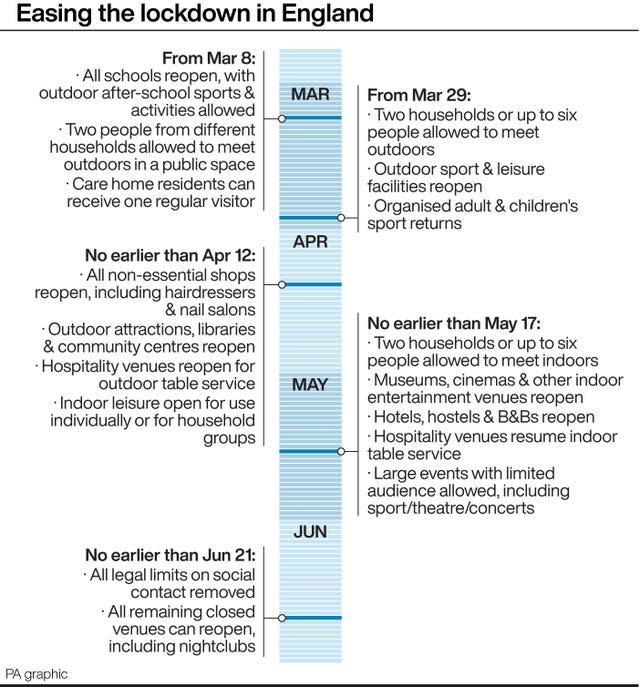Whitty warns against shortening timetable for lifting restrictions
England’s chief medical officer has said he would “strongly advise” against any move to shorten the timetable for easing lockdown restrictions.
Professor Chris Whitty said there were still risks to reopening society and the UK will experience another surge of cases at some point, potentially in late summer or through the autumn and winter.
Speaking to the Commons Science and Technology Committee alongside the Government’s chief scientific adviser Sir Patrick Vallance, Prof Whitty said the measures pencilled in for May 17, when indoor mixing of up to six people could be allowed, involved “significant risks”.
He told MPs he would “strongly advise” against any attempt to “concertina” the five-week interval between steps, saying the April 12 measures are “a very big block”, with shops and outdoor hospitality due to open.
May 17 further represents “a very significant block with a lot of stuff that is indoors for the first time, that is the point when we are really going to start to see some very significant risks accumulating, potentially”.
Prof Whitty said that although older and vulnerable people would mostly be protected by vaccines, younger people will not all be vaccinated by April, and they mostly drive transmission of the virus.
Modelling considered by the Scientific Advisory Group for Emergencies (Sage) has suggested that even under the most optimistic set of assumptions, at least a further 30,000 Covid-19 deaths could occur.
Prof Whitty said that “even if you have a relatively small proportion of people still remaining vulnerable, that still equates to a very large number of people overall”.
That might include people for whom the vaccine is not effective, those who do not take it or those in younger groups who have not yet been offered a jab, he said.
“What we are going to see is, as things are opening up, what all the modelling suggests is that at some point we will get a surge in virus,” he said.
“We hope it doesn’t happen soon, it might for example happen later in the summer if we open up gradually or because of the seasonal effect it might happen over the next autumn and winter.
“All the modelling suggests there is going to be a further surge and that will find the people who either have not been vaccinated or where the vaccine has not worked.
“Some of them will end up in hospital and sadly some of them will go on to die.”

Prof Whitty further defended the approach of allowing five-week time intervals between steps of unlocking in order to assess their impact on the virus – saying leaders in all countries had eased off too quickly in the past.
He told MPs: “If you look at the history of this all around the world, the history of this is not full of countries and individual leaders wishing they had done more, faster.
“It’s full of leaders who wished they had acted quicker and then been more careful as they take things off.”
He said the situation could “turn bad” very quickly if a close eye is not kept on it.
“I think a lot of people may think that this is all over,” he added. “I would encourage them to look at what is happening in continental Europe at the moment where a lot of countries are going back into rates going up and having to close things down again, having not been in that situation before.

“I think it’s very easy to forget quite how quickly things can turn bad if you don’t keep a very very close eye on it.”
He went on: “If you’re thinking about a surge in transmission, remember that the great majority of those who will drive a surge in transmission are not yet vaccinated and will not be vaccinated by Easter.
“So, I think the idea that that is the sort of get out of jail card in terms of a surge of transmission, I think, is to misremember where in the age spectrum the drive of transmission is, and it’s in younger adults, not in those who have so far been vaccinated, by and large.”
Prof Whitty added that “if you open up too fast, a lot more people die”.
He continued: “It is really important that we do not give any impression that what we are expecting is this just goes away and there is no further deaths.
“That is not realistic and I think to pretend that to the British public would be completely wrong.”
Asked whether “data, not dates” was just a slogan, Sir Patrick told the Science and Technology Committee “for us it is not”.
He added: “For us it’s very important that you measure what you’ve done and we don’t know what the impact of, for example schools going back, is going to be.
“And so there’s an estimate from the modelling group that it could have an effect on R, between 10% and 15% increase. We don’t know within that range exactly what it would be.”
He added: “Nobody would say that we know exactly how this is going to roll out over the next few months.
“And the important thing is to measure, adapt and take decisions in the light of information as it emerges.”

 Yahoo Movies
Yahoo Movies 
